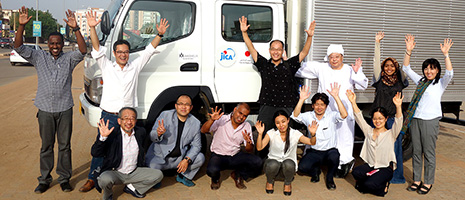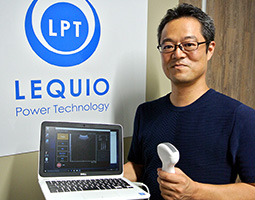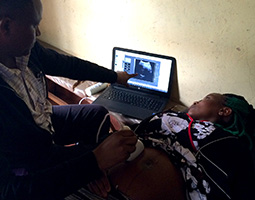Home > Highlighting JAPAN > Highlighting Japan September 2017 > SDGs: Challenges and Opportunities
Highlighting JAPAN


Diagnostic Ultrasound Imaging Equipment for Safe Deliveries
Low-priced diagnostic ultrasound imaging equipment developed by a company in Okinawa is contributing to prenatal checkups for pregnant women in Africa.
According to “Trends in Maternal Mortality: 1990–2015” released by the agencies of the United Nations, the global maternal mortality ratio (MMR; maternal deaths per 100,000 live births) was 385 in 1990, which declined to 216 in 2015. However, the rate in developing countries still remains high at 239 (12 in developed countries). In particular, the rate is 546 in sub-Saharan Africa, which is the highest worldwide. To improve this situation, the Sustainable Development Goals (SDGs) target the reduction of the global MMR to less than 70 per 100,000 live births by 2030 (SDG 3.1).
To achieve this, Lequio Power Technology Corp. is trying to contribute to the safety of women and children with its diagnostic ultrasound imaging equipment US-304 that can be used for prenatal checkups. The US-304 is a diagnostic tool to understand the condition of a fetus by placing a probe, a device for sending and receiving ultrasound, on the abdomen of a pregnant woman. Lequio was founded in 2011 in Okinawa (an island in Southern Japan). It has ten employees and mainly does business in developing countries, particularly in Africa.
Lequio’s relationship with Africa dates back to a previous project introducing “Dr. Car,” a mobile car clinic containing medical devices, into Sudan with the support of the Ministry of Foreign Affairs of Japan and the Japan International Cooperation Agency (JICA).
“Sudan, which experienced a long civil war, is making a strong effort for healthcare to rebuild the country. However, diagnostic ultrasound imaging equipment is very expensive and even most public hospitals are unable to introduce it. Few companies worldwide manufacture a low-cost device. I thought that if a low-cost, miniaturized integrated circuit (IC) were combined with Japan’s excellent manufacturing technology, diagnostic ultrasound imaging equipment could be manufactured at a much cheaper price,” says Tetsu Kawamura, President and CEO of Lequio.
Lequio started development in 2014, completing the US-304 in about one year and installing it in Dr. Car. The US-304 has a simple structure in which a 170-gram probe has a USB cable. When the cable is connected to a computer, an image can be displayed on the monitor. It is about one tenth of the price of a conventional device. The US-304 can be powered by a computer’s battery and can be used stably in developing countries where the electricity supply is unpredictable.
In 2015, the project in which the US-304 was used to support maternal and child health in Sudan was adopted as a Verification Survey with the Private Sector for Disseminating Japanese Technologies for Improving Maternal and Child Health Utilizing Ultrasound Equipment, a program for Supporting Overseas Expansion of Small and Medium Enterprises by JICA. In this project conducted in Khartoum, the capital of Sudan, Lequio provided training to about fifty midwives on how to operate the device and perform diagnostic imaging. Those midwives perform diagnostic imaging in the hospitals and health centers. Since the start of the project, nearly 500 pregnant women were examined monthly using the US-304 and abnormalities requiring a cesarean section during childbirth were detected.
“If you find an abnormality early, risk during childbirth can be reduced. In addition, when a pregnant woman sees an image of her fetus during the prenatal checkups, she is more conscious of her own health management,” says President Kawamura.
In addition to Sudan, the US-304 has also been purchased by a hospital in Kenya and a UN agency, and is currently used in about thirty countries, including pilot systems.
Lequio will build a database of videos of a probe being operated, ultrasound images, diagnostic imaging results and more, with a plan to start providing a service in 2017 in which users of the US-304 can access the database for the diagnosis of pregnant women. Lequio aims to improve the diagnostic technique of doctors and midwives as they diagnose a pregnant woman by referring to the database. In addition, the company is currently working on the development of a system to be operational in three years in which artificial intelligence (AI) uses the database to perform automatic diagnosis.
“If a small company like ours can profit continuously, more companies will enter this field. Such business expansion will also contribute to SDGs,” says Kawamura.
Lequio will also make a strong effort to develop educational software for everyone to easily learn about the technology on a computer, increasing the number of users of the diagnostic ultrasound imaging equipment.
© 2009 Cabinet Office, Government of Japan








